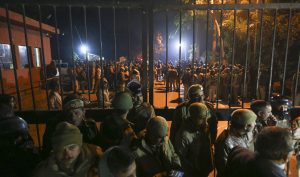On January 5, 2020, over 30 students and staff of Delhi’s Jawaharlal Nehru University (JNU) were admitted to the hospital after a masked mob of men and women entered the university wielding sticks and iron rods. Protests against the brutal violence at JNU have erupted across India in cities like Chandigarh, Bangalore, Mumbai, Hyderabad, and Ahmedabad.
Indian Prime Minister Narendra Modi has yet to comment on the violence in New Delhi.
Two days later, Nikhil Savani, the general-secretary of Gujarat for the National Student’s Union of India (NSUI), was beaten and allegedly stabbed in broad daylight for protesting against the JNU violence outside the headquarters of Akhil Bharatiya Vidyarthi Parishad (ABVP), a right-wing student body with ties to the ruling Bharatiya Janata Party (BJP) and its ideological parent organization the Rashtriya Swayamsevak Sangh (RSS). Around 10 people were injured, PTI reported.
Three ABVP members were detained a day earlier for interrupting protests against the JNU attack and Citizenship Amendment Act (CAA) at the Indian Institute of Management, Ahmedabad.
Aishe Ghosh, the president of the JNU Students Union (JNUSU), who was brutally beaten up in the Sunday attack and sustained head injuries after the attack, has alleged that it was an “organized” attack by ABVP.
“There is a clear nexus between the JNU security and vandals,” Ghosh told the reporters. In response to these allegations, ABVP has accused JNUSU and left-leaning students of perpetuating these attacks in a statement. Ghosh and the JNUSU have been actively campaigning against a fee hike at JNU.
On national television in a panel discussion with Times Now, the Delhi ABVP joint secretary, Anima Sonkar, has admitted that two of the armed men carrying rods in videos from the attack were ABVP members. Further, Sonkar stated that they were “asked” to arm themselves and were carrying lathis, iron rods and acid for “self-defense” based on messages seen in certain WhatsApp groups.
Screenshots of WhatsApp conversations of the alleged perpetrators planning the attack have gone viral on social media. Activists have been using WhatsApp names to identify the masked attackers to name and shame them online. Komal Sharma, a Delhi University student and ABVP activist, was identified as one of the female attackers in the videos from the attack. The allegations were further cemented by a screenshot of Sharma’s chat with a student who was her senior where she confirmed that she was at the scene of the violence.
Pinky Chaudhary of the Hindu Raksha Dal, another right-wing group, has claimed responsibility for the attack, which was said to stop “anti-national and anti-Hindu activities.”
In other parts of the country like Mumbai, hundreds of protesters have gathered at the Gateway of India since midnight on Sunday. Many also expressed oppositions to the Citizenship Amendment Act (CAA), the National Register of Citizens (NRC), and the National Population Register (NPR).
The Delhi Police has received criticism for its delayed response to the attack despite calls for help from students stuck inside the JNU campus. The police entered only after 7:00 after receiving formal communication from the JNU Vice Chancellor.
Two days after the violence, no assailants have been arrested.
As of now, there is only one FIR that has been filed and that is against Aishe Ghosh and 19 others for vandalism a day prior to the violence at JNU. The FIR was registered while Ghosh was in the hospital for injuries.
Critics have compared it to last month where the police entered Jamia Millia Islamia University (JMI) without the university authority’s permission and injured students that were protesting against the Indian government’s new citizenship law. On December 15, 2019, around 200 students were injured and tear gas was fired inside the library of JMI; a student was blinded in one eye.
At least three accounts of the mob attacking journalists outside JNU trying to report on the incident have been recorded. Doctors and nurses who rushed to help the injured were also harmed during the JNU attack and the glass and windows of ambulances were broken. The Indian Medical Association (IMA) strongly condemned this “mindless” violence on medical personnel who reached out to help the injured and wounded. “If doctors and nurses are not safe in the capital of the country it speaks volumes about the governance and the lack of it,” said the IMA statement.
Nityanand Rai, the Indian Minister of State for Home Affairs, said that “no BJP worker could have been a part of this attack as we believe in peace.” Nirmala Sitharaman, the Indian Minister of Finance and Corporate Affairs and JNU alumnus, has condemned the violence. “This govt, regardless of what has been said the past few weeks, wants universities to be safe spaces for all students,” she added in a tweet.

































